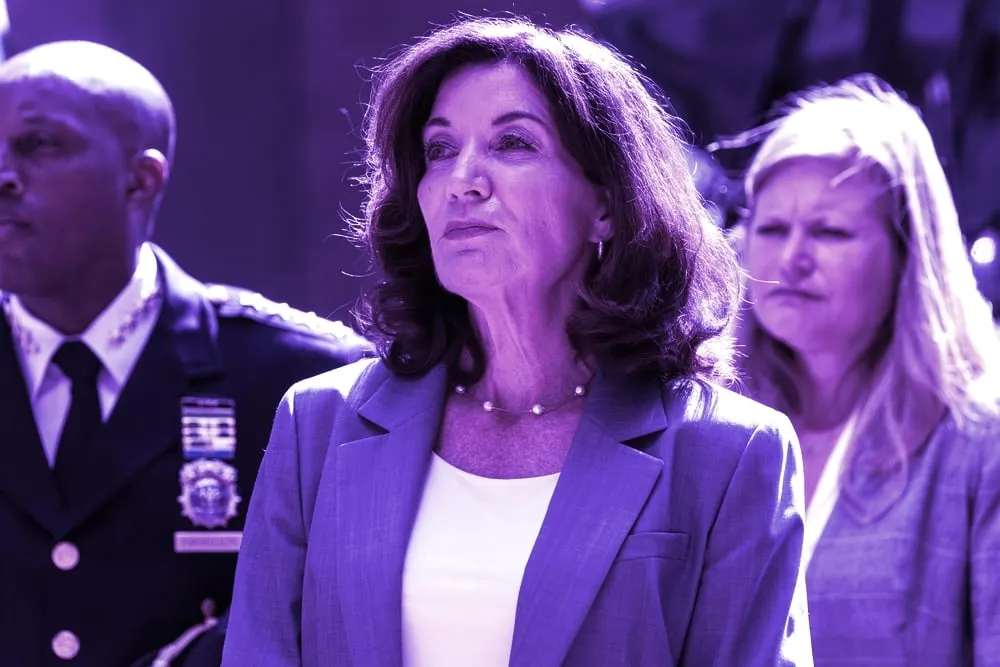The legal status of Bitcoin mining in the state of New York now rests in Governor Kathy Hochul’s hands—and she faces mounting pressure to pick a side.
On Friday, state senators in New York voted to approve a bill that would create a 2-year moratorium on crypto mining operations that use carbon-based power. The bill is now headed to Hochul’s desk, starting a 10-day clock for her to sign it into law or veto it.
If she signs the bill, it would make New York the first state in the U.S. to curtail the country’s new global dominance in Bitcoin mining.
Greenidge Generation, originally a coal-powered plant that has since switched to natural gas, prompted the debate over crypto’s environmental impact in the state when it pivoted to Bitcoin mining last March. As of December, the U.S. accounted for 38% of the average monthly hashrate on the Bitcoin network, according to the Cambridge Center for Alternative Finance’s Bitcoin Electricity Consumption Index.
Georgia has emerged as the clear leader in the states, accounting for 31% of the country’s hashrate. But New York’s 10% means it’s practically tied for second-largest with Kentucky and Texas, which account for 11% of the hashrate each, according to the CCAF.
Bitcoin and Ethereum both rely on proof-of-work network consensus that uses a lot of energy. Ethereum is in the process of transitioning to proof-of-stake, which uses less energy, but won’t make the switch for at least another couple of months.
Is Hochul pro- or anti-crypto?
Hochul hasn’t said much to indicate how she feels about the broader crypto industry.
There’s a short passage on stopping “cryptocurrency crimes” in her 2022 State of the State report, saying she intends to purchase blockchain analysis software to help state police prevent the use of crypto for gun trafficking.
Last week, after a breakfast meeting with state lawmakers, she told reporters that crypto mining could create jobs in the state.
“We have to balance the protection of the environment,” Hochul said, “but also protect the opportunity for jobs that go to areas that don’t see a lot of activity and make sure that the energy that’s consumed by these entities is managed properly.”
The jobs angle is an argument that’s been echoed by lobbyists and industry leaders in the run-up to the vote on the mining ban.
Kristin Smith, executive director of the Blockchain Association, called for “pro-tech NYers” to pressure state legislators to oppose the mining moratorium on Twitter yesterday.
In a response to the tweet, Digital Currency Group CEO Barry Silbert reminded State Sen. Tim Kennedy that DCG—the parent company of Grayscale, Genesis and CoinDesk—has created 150 jobs in the Rochester area and plans to open another office in Buffalo.
After the vote, Silbert thanked Kennedy for opposing the bill.
Foundry, another subsidiary of Silbert’s DCG, posted a statement on Twitter urging the governor to veto the bill.
“We sincerely hope that Governor Hochul will not sign this bill into law, as it represents the clear targeting of one industry among hundreds across New York State,” the crypto mining rig reseller said in the statement. “States like California and Washington are studying this issue to understand the technology before taking drastic steps to limit its growth.”
A statement from Foundry on the passage of the NYS Crypto Mining Moratorium Bill: pic.twitter.com/EFBh6qmmTL
— Foundry (@FoundryServices) June 3, 2022
The part about the New York moratorium targeting the crypto industry specifically for its use of carbon isn’t new. There have been suggestions that a statewide carbon tax could be a more equitable way to encourage miners to use renewable energy, without singling out miners.
“A carbon tax would send a signal to the market as a whole about policymakers' goals for encouraging cleaner energy. If you want to pollute, you'll have to pay a premium,” John Buhl, senior communications manager at the Tax Policy Center, told Decrypt via Twitter DM. “Offering select industries or technologies clean energy incentives or imposing limits on less desirable activities can get you there. But that can quickly become a game of whack-a-mole; crypto mining won't be the last activity NY lawmakers need to address.”
He clarified that the comment was his own. The Tax Policy Center, a nonpartisan D.C. think tank on tax issues, doesn’t have an official position on carbon taxes or how they might impact the crypto mining industry.
Other crypto industry participants have sought to make their voices heard with their wallet.
A regularly scheduled campaign report filed with the New York State Board of Elections last Friday shows Hochul received $40,000 from Ashton Soniat, CEO of crypto miner Coinmint. The company operates a Bitcoin facility at an old Alcoa aluminum smelter in Massena, New York.
The campaign donations also include more than $80,000 from Ostroff Associates, an Albany lobbying firm that represents Niagara Falls-based crypto miner Blockfusion.

